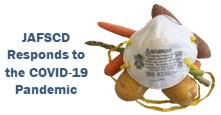Fostering food equity in an immigrant neighborhood of New York City during COVID-19
DOI:
https://doi.org/10.5304/jafscd.2020.101.028
Keywords:
Urban Food Systems, Food Equity, COVID-19, Pandemic, Community Engagement, Resilience, Chinatown, New York CityAbstract
Food equity includes the right to food that is culturally appropriate. Immigrant neighborhoods can be sites of contestation over who participates in the production, distribution, and consumption of food. Manhattan’s Chinatown is a good example of a neighborhood where food is central to its commerce, cultural heritage, and reputation as a tourist destination. The coronavirus’ origin in China caused immediate material impact on Chinese restaurants and food purveyors in New York City as well as in other cities with major populations of Chinese people. Chinatown suffered disproportionate closures of its grocery stores, restaurants, and produce vendors due to COVID-19 as compared to other neighborhoods in NYC. The grassroots response to this crisis is a reminder that people have the power to use food to assert the society that they desire, to shape a highly contested urban space, and to claim their right to the city.
Metrics

Downloads
Published
How to Cite
Issue
Section
Categories
License
Copyright (c) 2020 The Author

This work is licensed under a Creative Commons Attribution 4.0 International License.
The copyright to all content published in JAFSCD belongs to the author(s). It is licensed as CC BY 4.0. This license determines how you may reprint, copy, distribute, or otherwise share JAFSCD content.











